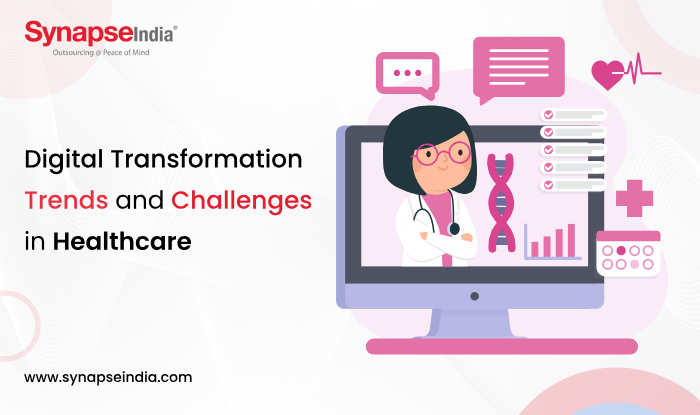 14 Mar 2024
14 Mar 2024“The healthcare industry is transforming digitally, driven by new technologies and evolving patient demands. These innovations revolutionize care delivery, empower proactive health management, and enable personalized, data-driven treatment by providers.”

With ever-evolving advancements in technologies of digital health trends, healthcare has gone through a lot of changes over the years. The introduction of laptops, computers, mobile phones, and other electronic devices, has enabled healthcare providers to provide better service to patients. Even after the onset of Covid-19, many things have been drastically changed. The healthcare industry has adopted many of the latest technologies to create better facilities and manage patients remotely. This transformation shift has created a major disruption in the healthcare digital transformation industry. In this blog, we will explore some major Digital Transformation in Healthcare.

Here are a few transformation trends in Healthcare that can be foreseen in the future:
The latest advancements in healthcare technology include telemedicine, wearable devices, and IoT-enabled medical devices has introduced. These innovations have enhanced patient monitoring, improved treatment outcomes, and enabled personalized care.
The power of data analytics and artificial intelligence in healthcare introduced predictive analytics and machine learning algorithms. This power of AI-driven insights revolutionizes clinical decision-making, population health management, and disease prevention strategies.
Digital health trends in the new era of the healthcare industry have introduced patient-centric care models enabled by Digital Transformation in Healthcare. These technologies for patient portals, remote monitoring devices, and mobile health apps have empowered individuals to actively participate in their healthcare journey and promote better health outcomes.
The introduction of interoperability and seamless data exchange in healthcare digital transformation systems and standardized data formats facilitate secure information sharing among healthcare providers. This has led to enhanced care coordination and patient safety in the healthcare industry.

Digital transformation in every sector has transformed the industry and created many positive outcomes. The healthcare industry has evolved as a transformative force, let’s explore its few advantages:
Digital Transformation in Healthcare provides healthcare professionals with to access real-time patient data which facilitates accurate diagnoses. Each patient is now treated with personalized treatment plans and proactive interventions that lead to better health outcomes.
Providing automated and administrative tasks empowers the digitization of medical records and the adoption of electronic health records (EHRs). This has led to streamlining the workflows and reducing cost and burden in administration. It allows healthcare digital transformation professionals to focus more on patient care and less on paperwork.
Initiatives in digital health trends help healthcare organizations optimize resource utilization and reduce operational inefficiencies, which prevent unnecessary hospital readmissions and lead to significant cost savings over time.
Devices that are IoT-enabled devices enable remote monitoring of patient's vital signs, medication adherence, and disease management. This allows healthcare providers to intervene proactively and prevent complications, particularly for chronic conditions.
The advancement of Digital Transformation in Healthcare has fostered a culture of innovation. The rapid enabling of experimentation, collaborative research, and the development of breakthrough technologies such as precision medicine, genomics, and telehealth solutions.
While digital health trends offer numerous benefits in the healthcare industry, there are many potential challenges as well. Here are a few of them:
As digitization is increasing, keeping patient records and other healthcare information has ensured enhanced security and privacy of sensitive data. Healthcare digital transformation must implement cybersecurity measure that protects against data breaches, cyber threats, and unauthorized access.
Systems in healthcare operate archived, leading to teamwork challenges while sharing data across different systems and platforms. Systems achieve seamless interoperability which requires standardized data formats, protocols, and interoperability frameworks. It facilitates data exchange and interoperability between disparate systems.
Most organizations rely on outdated technologies and legacy systems, which sometimes fail to be compatible with modern digital solutions. Integrating advanced digital solutions can be complex, time-consuming, and require careful planning and implementation. These strategies should be implemented with minimal disruption so they won’t cause any disruption to existing workflows.
Healthcare professionals have acquired new skills and adapted to new workflows that embrace new ways of working by implementing digital health trends. Providing comprehensive training and support to the healthcare staff ensures to successful adoption and use of Digital Transformation in Healthcare and tools.
Offering digital health solutions and opportunities empowers patients to improve their engagement. To achieve this widespread and making it adopted among patients can be challenging. There could be many factors such as limited access to technology, digital literacy barriers, and concerns about data privacy that may hinder patient adoption of digital health solutions.
In the above guide, we’ve studied how the healthcare industry has transformed and improved patient care with digital transformation. Based on digital tools such as artificial intelligence, data analytics, and telemedicine have revolutionized the industry and made healthcare services more accessible, personalized, and efficient. As we move towards Digital Transformation in Healthcare we are getting introduced to improving access to healthcare for everyone. This helps in ensuring quality care for everyone. Having the right team will help in transforming your healthcare organization to give better health to patients.

